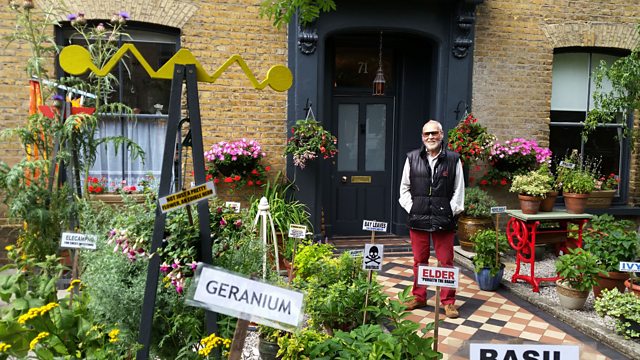Dalston
Eric Robson and the team are at Dalston Eastern Curve Garden.
Produced by Howard Shannon
Assistant Producer: Hannah Newton
A Somethin' Else production for �������� Radio 4.
Last on
More episodes
Previous
Next
![]()
Alex Kapranos: 'Being in the garden inspires my music'
We always knew that gardening was cool, but Franz Ferdinand's Alex Kapranos confirms it
Questions and Answers
Q – We make wood-fired pizzas here, what pizza toppings would the panel suggest to grow in the garden? What would produce the best flavour and would be quick to grow and replenish?
Pippa – Obviously some lovely tomatoes but also some half or mini-tomatoes, tonnes of basil, also garlic, peppers (for roasted peppers)
Bob – Italian plum tomatoes because they’re not so watery. Genovese (small leaved) basil – has a more piquant flavour. Chives because you can cut any amount and they’ll keep coming. Spring onions and shallots.
James – Carolina Reaper – it’s the world’s new spiciest chilli as of December 2013 – it has over 2.2million Scoville units.
Q – Air quality is becoming an issue in London and my question is to do with plants’ role in cleaning the air. If we were to grow vertical plants up the walls of buildings in the city which varieties would the panel advise?
Bob – Plants with sticky leaves like the White Tobacco – which can grow up to 5 feet tall – as lots of dust will stick to the leaves. And Lychnis, too.
Pippa – The Spider Plant. Also, the Boston Fern which is a very tough fern.
James – One of the big problems with living walls is patchiness, say if an irrigation system fails, you end up with big empty areas. Things like the Peace Lily, the Spider Lily, etcetera will spread over those gaps.
Q – I am limited to balcony gardening. I am a novice and a ‘north-facer’. Can the panel suggest something hardy and colourful for my balcony please?
James – A hardy Begonia, for example Begonia evansiana grandis, you get that look of the rainforest but in the UK. Also some hardy orchids and ferns too.
Pippa – I would think about leafier crops like salad leaves, spinaches, mooli, radishes.
Q – I’ve been trying to edibles in containers on the fire escape but it’s been disappointing in yield. What would you suggest that would give a good harvest?
Bob – Salad leaves would give you the best returns as you don’t need very deep containers so you could stack them up and get a few layers going, particularly if you use trays and use a good compost (with no weed seeds in it, so a bought one), and then you sow fairly densely. Grow them for a week, two weeks, then you cut them off, throw the compost away, and start another lot off.
Pippa – Why not hang things from the fire escape’s handrail? Or get window boxes with hooks underneath? Or consider containers than are quite deep, and hung off the rail, then you can plant into them. Or try courgettes.
Q – We have been working hard all spring and summer to expand and create new planting beds. We’ve been filling them with herbaceous perennials and lots of things that are good for pollinators but we’ve developed a mildew problem. How can we get rid of it?
Pippa – Mildew is a fungal infection that looks a bit like you’ve sprinkled icing sugar on the plant. The two things mildews love are plants that are dry at the roots and also (confusingly) if the air is muggy, eg if things are closely planted or on/off rain. Advice: whisk off infected leaves as soon as you see them, you can try and improve air circulation, you can definitely water them direct to the soil/base of the plant to help too.
Q – Urban wasteland make natural habitats for bees and butterflies – can the panel recommend inexpensive seeds?
James – Look at the spice rack of supermarkets (or a local Chinese supermarket) – and think about fennel, dill, caraway, fenugreek… nice combination of cheap, good pollinators, and edible
Bob – Poppies – full of pollen and you can use the seeds on breads etc. But the cheapest seeds are those sold for green manures, like clovers and buckwheat and phacelia.
Q – I was thinking of starting a Dalston snail farm so my neighbours could bring me their snails and I could sell them on to the local Hipster restaurants… Would the loss of the snails have an adverse effect on the gardens?
Bob – I believe it would actually – they create a lot of manure and I imagine plants would be expecting it. The Roman Snail is the best for eating. You need to feed snails bran in order to clean them for eating.
James – Feed them for a couple of days and then starve them for a couple of days (in order to make sure that the digestive tract is clean)
Pippa – I wouldn’t worry too much because you’ll never succeed in collecting them all up
Broadcasts
- Fri 7 Aug 2015 15:00�������� Radio 4 FM
- Sun 9 Aug 2015 14:00�������� Radio 4
Six of GQT’s naughtiest gardening innuendos
When Gardeners' Question Time got mucky.
Podcast
-
![]()
Gardeners' Question Time
Horticultural programme featuring a group of gardening experts



